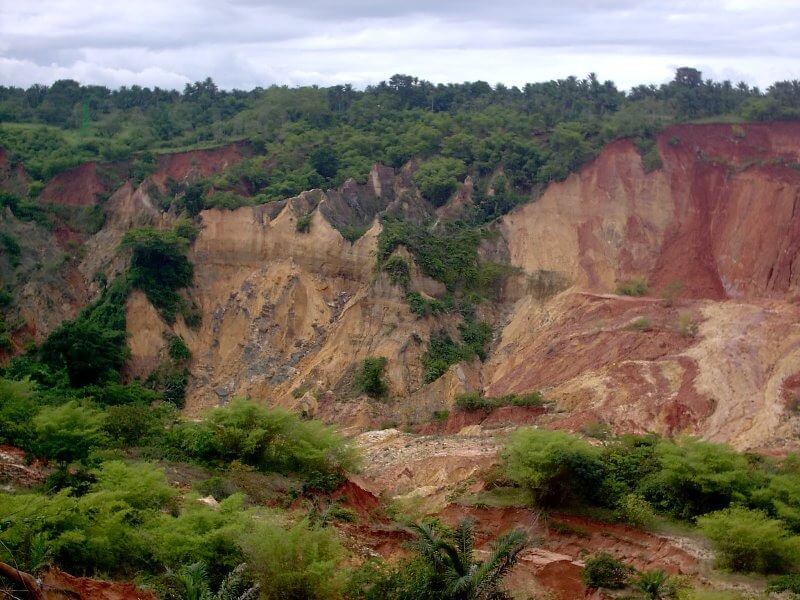Impacts of Climate Change on Education, Health, Housing, Cultural and Historical Sites In Africa.
Climate change is destroying education, health, housing, cultural and historical sites in Africa, and something needs to be done about it.
Introduction
Global climate change is a phenomenon that has been classified in the United Nations Security Council as the ‘biggest threat modern humans have ever faced” .
It is caused by the unprecedented emission of greenhouse gasses into the atmosphere, mostly as a result of past and present activities by industrialized countries.
Unfortunately, even though the whole of Africa contributes less than 4 percent of global greenhouse gas emissions, it is the continent that is most “vulnerable to the impacts of climate change”.
Climate Change, Torrential Rainfall, Flooding and Gully Erosion

These gully erosion and landslide activities are believed to be among the worst impacts of climate change in Africa.
Higher temperatures being brought about by climate change increases the amount of evaporation from the earth surface.
This means formation of larger clouds, heavier/torrential rainfall and consequent flooding.
On another hand, the higher temperatures melt up glaciers and ice caps in temperate regions.
These massive glaciers melt into the oceans and water bodies, leading to rise in sea levels and consequent implications for connected rivers and tributaries.
So, low lying coastal areas across Africa and in Nigeria get flooded.
Also, since the level of water in rivers and lakes are higher, their capacity to contain more water that drain into them during rainfall is reduced. Hence, incidence of flooding during rainfall is becoming higher.
The combination of torrential rainfall and sea level rise cause surface and subsurface flooding activities that are above the limits that the soil formation in certain parts of Africa and Nigeria can handle.
Believed to be the worst impact of climate change in Nigeria and Africa is the problem of gully erosion and landslides that are most prevalent in the Nanka areas.
Nanka, Agulu, Ekwulobia, Oko and surrounding communities in Anambra state (classified as Nanka areas) as well as most parts of the south eastern geopolitical region of Nigeria suffer this problem.
Impact on education, health, housing, cultural and historical sites
As landslides occur, community lands and anything on its surface cave into the deep gullies.
There in the deep gullies, the debris is broken down into smaller fragments and washed off by erosion activities, making the gullies hungry again. So, more torrential rainfall causes more landslides and the cycle continues.
Houses used for educational purposes in the communities, such as primary and secondary schools, are destroyed.
This means that more children have to study under unconducive environments prone to rainfall, sunshine and even reptiles, while other children who cannot cope may drop out thereby increase the number of out-of-school children.
Primary healthcare centers that serve the communities cave in.
The effect of this is that healthcare workers are forced to leave the affected areas, resulting to poor access to healthcare and its consequent negative implications on maternal health, infant mortality and the general well being of people living in those areas.
Historical and culturally significant sites are destroyed. The effect of this is that valuable cultural heritage is lost, denying the people of the opportunity to fully understand their identity.
Living homes, community civic centers and markets are also not spared. The effect of this is that some of the people become homeless, dependent on external support and more prone or vulnerable to social vices.
It also increases the housing deficit in Nigeria, which are already at record levels.

These gully erosion and landslide activities are believed to be among the worst impacts of climate change in Africa.
Climate change fuels torrential rainfall, flooding and the activities of gully erosion that destroy buildings used for educational purposes in the Nanka areas of Anambra state and other states in the south-eastern region of Africa’s most populous country, Nigeria.
Such buildings include primary school buildings, secondary school buildings and informal educations centers.
The effect of this is that more children have to study under unconducive environments prone to rainfall, sunshine and even reptiles, while other children who cannot cope may drop out.
Climate change fuels torrential rainfall, flooding and the activities of gully erosion that destroy primary healthcare centers in the Nanka areas of Anambra state and other states in the south-eastern region of Africa’s most populous country, Nigeria.
The effect of this is that healthcare workers are forced to leave the affected areas, resulting to poor access to healthcare and its consequent negative implications on maternal health, infant mortality and the general wellbeing of the people living in the affected areas.
Climate change fuels torrential rainfall, flooding and the activities of landslides and gully erosion that destroy peoples homes in the Nanka areas of Anambra state and other states in the south-eastern region of Africa’s most populous country, Nigeria.
The effect of this is that some of the people become homeless, dependent on external support and more prone or vulnerable to social vices.
It also increases the housing deficit in Nigeria, which are already at record levels.
Climate change fuels torrential rainfall, flooding and the activities of landslides and gully erosion that destroy important cultural and historical sites in the Nanka areas of Anambra state and other states in the south-eastern region of Africa’s most populous country, Nigeria.
The effect of this, among others, is that valuable cultural heritage is lost, and the people are denied of the opportunity to fully understand their identity.